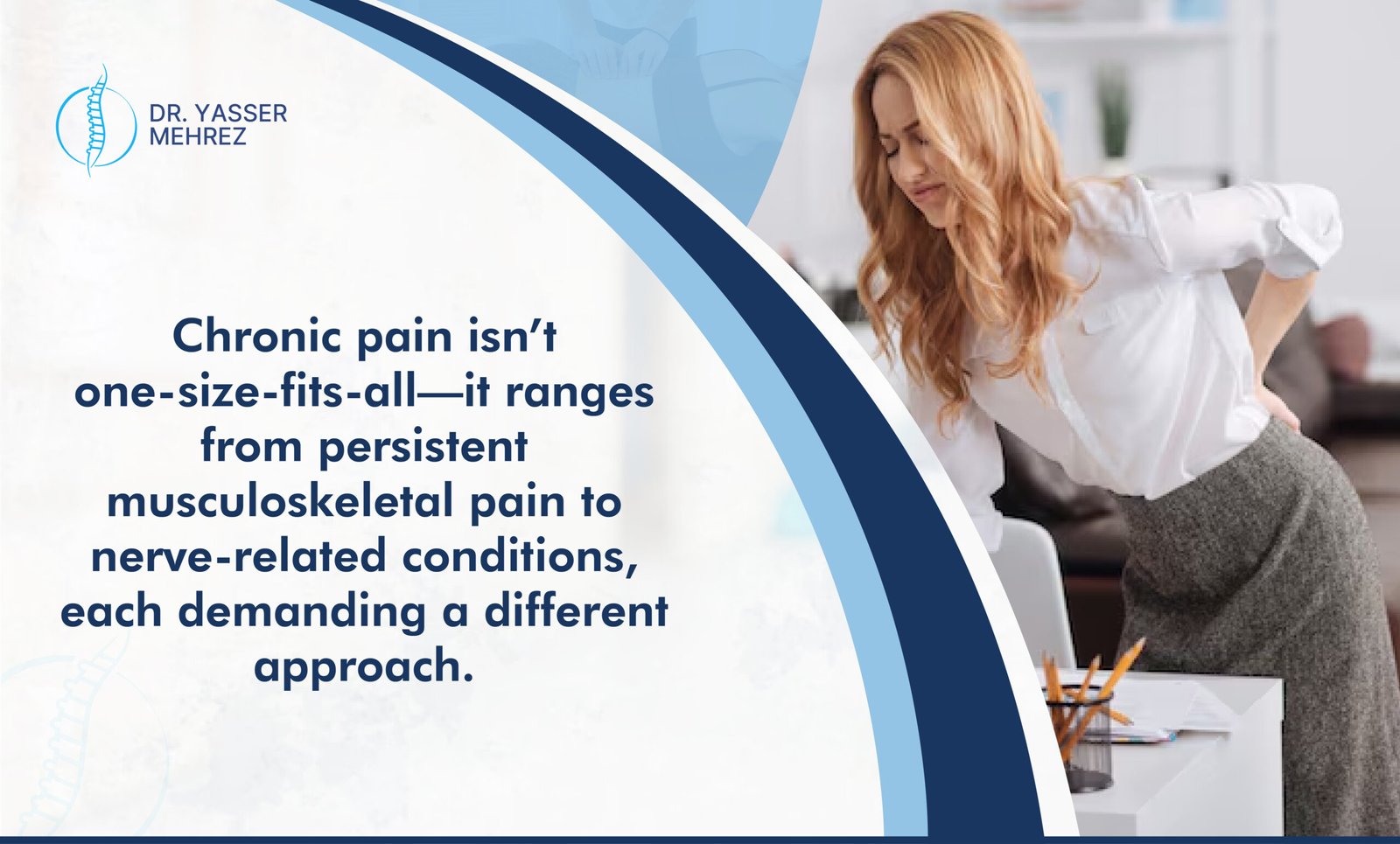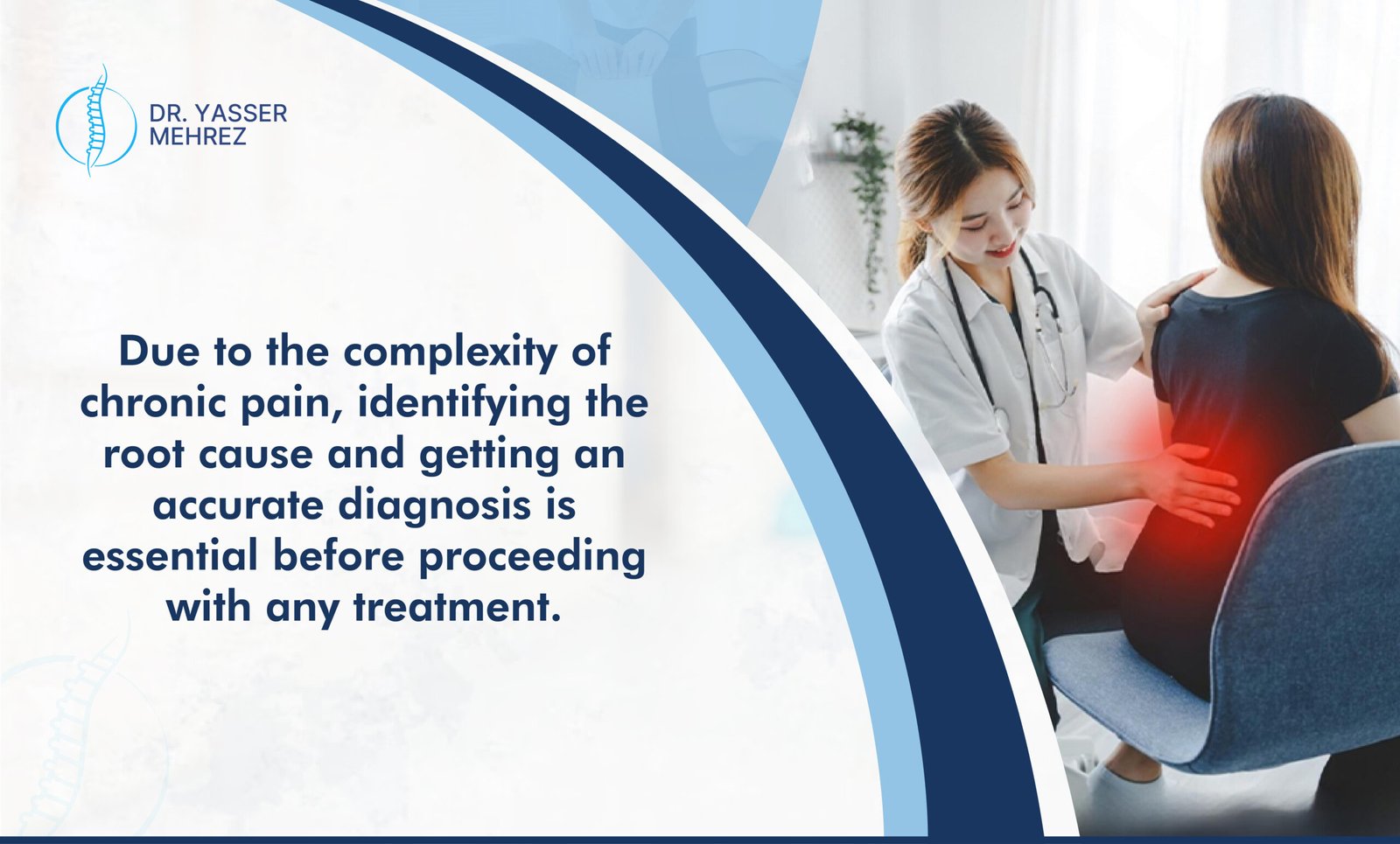If pain lasts for months or years, it can affect all the other areas of your life, from work and social life to emotional and mental health. Persistent chronic pain can feel frustrating over time and become a nightmare for many people.
This blog will discuss its symptoms, causes, risk factors and possible chronic pain management UK options.
What is Chronic Pain?
Chronic pain is a severe condition that persists for more than 3 months or 12 weeks, affecting your physical, emotional, and mental well-being. It occurs due to multiple causes and may be occasional or continuous.
Affecting over 43% of adults in the UK, this pain is one of the most common conditions people seek medical help for.
Types of Chronic Pain
Chronic pain is an associated symptom of many diseases, including infection, injury, and more.
Common types of chronic pain include:
- Pain due to cancer
- Chronic disc-related pain
- Joint pain or arthritis
- Neck pain
- Neuralgias and neuropathies (nerve pain)
- Psychogenic pain
What Causes Chronic Pain?
It can occur due to multiple reasons but primarily stems from an illness such as cancer or arthritis. The cause is evident in some cases, whilst difficult to diagnose in others due to its complexity.
General causes of pain include:
• Musculoskeletal pain
Pain that occurs in your joints, muscles, tendons, ligaments, or overall skeletal system. It occurs mainly due to injuries.
• Neuropathic Pain
Results from a malfunctioning nervous system and is often described as burning or shooting pain.
• Visceral Pain
Pain is felt in internal organs and organ systems, such as the stomach, lungs, liver, or kidneys.
• Inflammatory Pain
Pain due to infection, tissue damage, or inflammation, such as arthritis.
• Psychogenic Pain
Pain without any physical cause is mainly linked to emotional or psychological factors.

What are the Associated Risk Factors?
• Aging
As you get older, your body is more likely to experience chronic pain due to degenerative changes, sensitivity to injury, and wear and tear.
• Occupational Factors
If you have a manual complex or tiring job, you may experience chronic pain due to prolonged fatigue.
• Genetics
Certain conditions, such as arthritis or headaches, can run in families, increasing your risk of developing chronic pain.
• Injury
Sudden injury or a history of past injury can cause chronic pain.
• Persistent severe stress
Prolonged stress can also cause chronic pain.
What are the Symptoms of Chronic Pain?
The most prominent symptom is severe pain itself.
Other than that, chronic pain may lead to anxiety, depression, fatigue, isolation, insomnia, or mood disturbances over time.
• How Does it Feel?
Experiencing chronic pain can be pretty debilitating. You may experience it as an aching, shooting, burning, or throbbing sensation.
Chronic pain often makes it hard to sleep well, which can make the pain feel even worse over time.
How Is It Diagnosed?
For an accurate diagnosis, you need to identify the root cause. A complete clinical evaluation, including a thorough history, physical exam, and lab tests, is necessary.
Due to its subjective nature, your cooperation is essential, as only you can describe it better.
During evaluation, you will be asked about location, intensity, duration, frequency, nature, or quality of pain.
Consult a pain management expert in the UK for pinpoint diagnosis and treatment plans.

How to Manage Chronic Pain?
Chronic pain management UK involves a combination of interventions, lifestyle modifications, and remedies to combat the effects of chronic pain and live a normal life.
It focuses on improving the functionality and overall well-being of your life.
Treatment may target the root cause or pain management as a symptom and starts with conservative therapies, such as:
• Weight Management
Managing weight is the first step towards normal functioning as it reduces pressure on your joints and muscles.
• Stress Management
Due to its connection with chronic pain, managing stress can ease pain and improve your overall well-being. A strong support system can improve the success of long term pain management plans.
• Regular Physical Activity or Exercise
Gentle exercise keeps your body active and reduces stiffness. Low-impact activities, such as swimming, yoga, walking, and aerobics, decrease the intensity of pain and make the condition more manageable.
• Physical Therapy Plan
A tailored therapy plan supports recovery and restores movement under expert supervision.
• Occupational Therapy (If Needed)
Occupational therapy can help you perform daily tasks with less discomfort if your pain is related to professional demands.
• Cognitive Behavioural Therapy Sessions
CBT helps manage pain-related thoughts and emotional stress. It also reduces associated anxiety and depression, making pain easier to handle.
• Electrotherapy Devices
Transcutaneous Electrical Nerve Stimulation (TENS) and Electrical Muscle Stimulation (EMS) offer non-drug pain relief through electrical stimulation. They block nerve signals to reduce the sensation of pain.
• Steroid, Botulinum Injections, NSAIDs, or Opioids
These medications target inflammation or muscle tension to relieve pain. The latest pain management guidelines UK focus on reducing long-term opioid use.
Consult a Pain Management Expert in the UK
Living with chronic pain feels more like existing with pain when you are unable to participate effectively in any activities or have limited functionality.
Currently, there is no fixed cure for chronic pain. The best approach is to lessen the pain through simple lifestyle changes and therapies.
The NHS provides a arange of services for diagnosing and managing chronic pain across the UK. Consulting a pain management specialist helps you reclaim comfort, confidence, and control over your life.
Treatment Options Offered by Dr. Yasser Mehrez
Dr. Yasser Mehrez carefully evaluates your medical history and applies the pain ladder approach to develop a personalised pain management plan that works to improve your overall well-being.
He offers multiple modern treatment options to manage your chronic pain, such as:
• Epidural Infiltration
Epidural infiltration delivers medication directly around your spinal nerves to reduce pain.
• Epidural Steroid Injections (ESI)
Epidural steroid injections help reduce inflammation and provide relief from chronic back pain.
• Fluoroscopic Guided Injections (FGI)
This FGI technique utilises X-ray guidance to ensure the precise delivery of medication to the source of your pain.
• Radiofrequency Ablation (RFA)
RFA uses heat to block pain signals from specific nerves. It is specifically targeted at nerves that cause pain.
These advanced techniques are carefully selected based on an evaluation of your condition to ensure targeted and effective treatment.
Book an appointment with Dr. Yasser Mehrez today and take the first step toward a pain-free life.
FAQs
What is the most effective treatment for chronic pain?
No single treatment option works for all, but lifestyle modifications and stress management can significantly reduce the symptoms. A balanced diet, regular exercise, quality sleep, and support from friends or family are highly effective. Dr Yasser Mehrez can help.
How to reduce chronic pain naturally?
Herbal remedies, such as turmeric, ginger, or capsaicin, offer natural analgesic and anti-inflammatory properties. Heat and cold therapy, as well as Epsom salt baths, can help relieve muscle and joint strain, making them effective options for natural pain management.
What vitamin helps with chronic pain?
Although a natural and balanced diet can help alleviate chronic pain, vitamin D is primarily associated with its relief, particularly from musculoskeletal and neuropathic pain. Vitamin B12 and Vitamin C also aid in its management.
What stops nerve pain immediately?
Although there is no instant treatment option, using topical analgesics like capsaicin cream can block pain signals. Moreover, over-the-counter pain killers are also effective for short-term pain relief.







